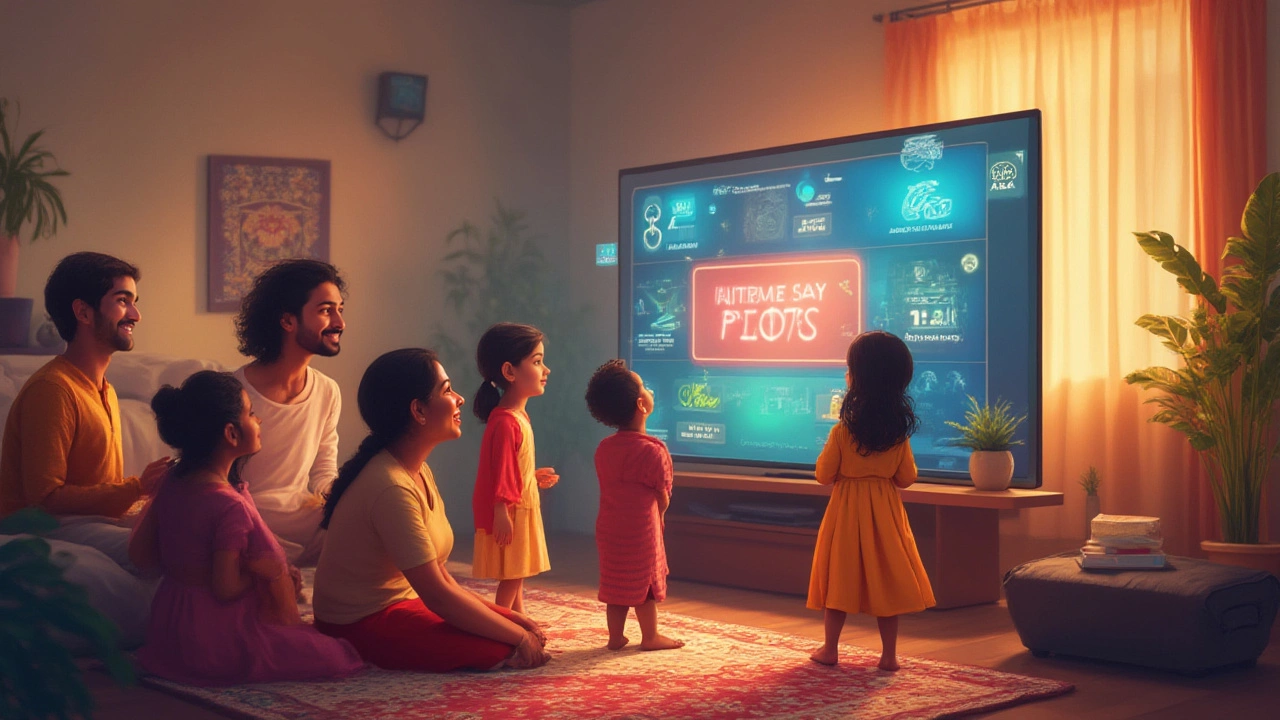Best Free AI Apps in 2025: Detailed Review and Comparison
 Jul, 7 2025
Jul, 7 2025
If you thought the AI app rush peaked last year, you’re in for a surprise. People are practically swimming in new tools, from smart chatbots spitting out essays to image generators that make you wonder if a human even drew them. Here’s the kicker—most users don’t want to pay, at least for basics. So, which is the best best free AI app right now? Get ready for the straight talk, tested options, and actual facts about real apps you can use without dropping a dime.
The AI App Scene in 2025: What Changed?
AI apps exploded, and that’s not just hype. According to a 2025 Newgen Research survey, app downloads for generative AI doubled between January and June alone. People use them for writing, learning, photo editing, even coding. So what actually changed? For starters, AI models finally learned to sound like people, not robots. That robotic, stilted grammar you heard in chatbots back in 2022? Pretty much gone. OpenAI’s GPT-4o, Google Gemini, Meta AI, Claude, and a parade of smaller players all polished their free apps—because they realized users won’t pay to test a clunky tool.
By the way, the competition today is fierce, because big names offer free tiers that actually work well. Back in 2023, you got limited bots or capped requests. In 2025, even the free options respond instantly, remember context, and handle images, PDFs, and code. If you’ve used ChatGPT or Gemini lately, you probably noticed the difference right away. They’re faster, smarter, and less prone to hallucinate (AI lingo for making things up).
Let’s put this in perspective—thousands of new AI apps launch every week. A handful go viral on TikTok or X, and a smaller group gets attention from developers and students. Still, just four names stand out for free use: ChatGPT (OpenAI), Google Gemini, Microsoft Copilot, and Poe by Quora. These are all cross-platform, and each has a free app available for iOS and Android.
Comparing the Most Popular Free AI Apps
This is where things get interesting. You’ll see wild claims from fans: "ChatGPT solves all my emails!" or "Gemini knows more than Wikipedia!" To cut through that, I dug into user ratings, complaint threads, and used each app for hours. Here’s what the best ones actually deliver in 2025.
| AI APP | Key Free Features | Monthly Usage Limit | User Rating (Play Store, July 2025) |
|---|---|---|---|
| ChatGPT (OpenAI) | Text, code, images, voice chat | Unlimited, minor delays under heavy load | 4.8/5 |
| Google Gemini | Text, search, images, integrates Google Docs | Heavily capped per day, resets daily | 4.5/5 |
| Microsoft Copilot | Text, search, Bing integration, images | Fast, but rate-limited on some features | 4.4/5 |
| Poe by Quora | Multiple bots (GPT-4, Claude, Gemini), text | Mix of free & paid, daily resets, fastest for quick chats | 4.3/5 |
OpenAI’s ChatGPT remains the favorite on both Google Play and Apple App Store. The app lets you use ChatGPT-4o, which is their latest, and allows unlimited questions a day unless the servers get slammed. Asking it to write emails, fix Python code, or summarize articles works smoothly, and the new voice feature feels like you’re talking to a real assistant. Google Gemini is a strong competitor. Its app integrates tightly with Google Docs, Sheets, and Gmail. For students, that’s gold. Only downside? There’s still a daily request cap on the free tier, and you’ll hit it fast if you use it all day.
Microsoft Copilot, which is built into Windows 11 but also available as an app, wins on integration if you do research, shopping, or need quick Bing results. It’s less creative for essays but great for facts and planning. Poe by Quora focuses on speed—giving access to several top AI models in one place—but pushes you into paid tiers for large tasks or continuous use. Still, you can ask a quick question to Claude or Gemini without logging into each service.
Pro tip—if you’re bouncing between devices, go for ChatGPT or Gemini. Both support syncing across phone and web with one login. But if you want to try different AI personalities (say, start a chat with Claude for business and switch to GPT-4o for stories), Poe is fun.

What Can You Actually Do With Free AI Apps?
People often don’t realize how much time these apps save. You can auto-draft essays, email replies, cover letters, or blog posts in seconds. Students use them for research, summaries, or even making flashcards. The new image generation tools like DALL-E 3 (inside ChatGPT) or Gemini’s image prompt are huge for designers: create a unique logo, generate mood boards, tweak social posts—all for zero cost.
Let’s get more real. You can drop a PDF into ChatGPT Plus and ask for a summary, quiz questions, or even a list of key points. Teachers use this to set up exams in minutes. Writers get character drafts, plot outlines, and even poetry for free drafts. Microsoft Copilot shines if you’re planning trips (it pulls in live data), need recipes, or want product comparisons for online shopping. For developers or coders, all four main apps can debug code, translate between programming languages, and explain errors in plain English.
Tip: Use ChatGPT to brainstorm names or social captions, Gemini for research, and Copilot for shopping or trip planning. Don’t be shy about mixing them. Each app handles tasks differently and seeing which performs better is half the fun. The best way to get a feel is to give each one your daily routine for a week. Keep track of which one gives the most useful answers and fastest turnaround.
Parents use AI apps to answer endless kid questions, musicians use them for lyric ideas, and some even help with language learning. Gemini picks up local news and trends, and Poe’s bots can help with trivia and general knowledge. Just remember—AI sometimes gets facts wrong. Always double-check anything serious, like medical or financial advice. If an answer feels off, ask the same question with a few different wordings, or check with another app.
Hidden Limits, Privacy, and What to Watch For
Here comes the less fun part—limits and privacy. None of these free AI apps give you truly unlimited usage. Daily caps, slowed responses during peak times, and locked features (like file uploads or advanced tools) push you toward paid plans. For example, ChatGPT lets you use DALL-E 3 image generation and voice chat but restricts large PDF uploads or “memory” across chats to premium users.
Gemini’s daily request limit can be especially annoying if you’re a heavy user. You can typically ask 30–60 questions a day before the app asks you to wait. Poe mixes in even tighter caps for GPT-4, Claude, and Anthropic models. Copilot’s free tier rarely blocks basic search but restricts certain plugins or AI-powered image tools to paid Office365 users. Pro tip: If you’re working on a big project, spread tasks across different apps to avoid hitting the daily wall.
What about privacy? AI apps collect data. Chat history, texts, sometimes voice recordings—these are logged by the app and sometimes used to "improve the model." If you don’t want anyone seeing your data, double-check the privacy settings. ChatGPT, for instance, lets you turn off chat history or delete conversations. Google Gemini’s data is tied to your Google account, so deleting or exporting data takes a few steps. Microsoft Copilot syncs with your Microsoft account, which means your info can travel between devices unless you opt out.
Stay cautious with sensitive topics—never share passwords, full ID info, or anything you’d regret landing in a training dataset. If privacy is a deal breaker, you might want a local AI app like LM Studio or a Python-based tool, but those require more setup than one-click installs.

Tips for Getting the Most From Free AI Apps
Using AI like a pro isn’t rocket science, but a few simple habits make these tools way more powerful for you. First tip—give clear, specific instructions. Instead of saying “write a cover letter,” say “write a friendly cover letter for a marketing job at a travel company, focus on teamwork.” You’ll get more relevant, human-sounding text.
Second, get familiar with the extra features. ChatGPT’s voice mode is shockingly good—think of it as a Siri or Alexa that actually understands nuanced questions. Google Gemini integrates with your browser tabs, so you can pull research straight into your writing. Copilot now highlights webpages as you scroll and suggests questions as you read. Poe lets you set custom bots or choose which AI model responds to your prompt, helpful for comparing answers across engines.
Here are a few more quick hacks:
- Use keyboard shortcuts or voice input to speed things up.
- Test the same question on multiple apps to cross-check accuracy or bias.
- Bookmark useful threads (all four major apps let you star or pin conversations now).
- Don’t forget to explore community forums for ready-made prompts or hidden features. Reddit, X, and Discord groups have entire sections sharing prompt templates for essays, songs, legal help, and more.
- Snap a photo and upload it—modern apps can analyze images, describe contents, or even transcribe handwritten notes. Works wonders for students and business pros.
- If you keep hitting usage caps, use a combination—start long projects in ChatGPT, switch to Gemini for research follow-ups, and finish in Copilot or Poe.
One tip I give everyone: treat AI as a brainstorming buddy, not a fact machine. The best results come from digging in and asking “what if we rephrase that?” or “give me 3 different takes.” Over time, you’ll learn each app’s quirks and favorite topics. Don’t be afraid to challenge their answers, either—they’re always being updated and often surprise you.
So, which free AI app wins? If forced to pick only one for productivity, writing, and creative tasks, ChatGPT’s free app edges out the rest thanks to reliable access and new features. But if you really want to juice your daily workflow, use two or three together and play to their strengths. After all, the best app is the one that fits the way you actually live and work. Next time you see someone typing out an email by hand, you’ll wonder if they’ve even tried free AI.